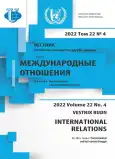Postcolonialism in International Studies: Two Faces of Theory
- 作者: Loshkariov I.D.1
-
隶属关系:
- MGIMO University
- 期: 卷 22, 编号 4 (2022): Postcolonialism and Anti-colonial Struggle
- 页面: 659-670
- 栏目: THEMATIC DOSSIER
- URL: https://journal-vniispk.ru/2313-0660/article/view/320508
- DOI: https://doi.org/10.22363/2313-0660-2022-22-4-659-670
- ID: 320508
如何引用文章
详细
Postcolonial theory is gradually entering the research arsenal of international relations, although it is not yet widely represented in modern international political science. The importance of mastering the tools and techniques of this paradigm or a set of relatively close paradigms is associated both with the gradual rejection of the Eurocentric vision of global and regional political history, as well as the identification of spatial and temporal features of theorizing on international issues. In this regard, it is necessary to identify the internal potential of postcolonial theory and those ontological, epistemological and methodological foundations of this theory, which will allow more concrete application of its concepts, interpretations and causalities to international realities. That is why the article attempts to single out the basic types of the postcolonial theory of international relations while revealing their key methodological principles and assessing the originality of the object and purpose of the study. On the basis of the interpretivist principles of the analysis of theories, the author reconstructs the key ontological and epistemological foundations and features of the interpretation of causal relationships in postcolonial way of thinking. The article highlights two main types of postcolonial theory - Postcolonialism of difference and Postcolonialism of interdependence. Despite the similarity in the basic desire to liberate scientific discourse from the techniques and concepts of Eurocentric science, these types of postcolonial thinking differ in the degree of willingness to break ties with the colonial past, in the requirements for the final result of the study, and also in the appreciation of space and social time in theorizing per se. Based on the identified types of postcolonial theory, the author proposes the trajectories of interaction of the theory with other schools of research in international relations, and also identifies geographically limits of these types. Thus, the article demonstrates porousness, analytical potential and adaptiveness of the discussed approaches that makes them more useful for the current IR studies.
作者简介
Ivan Loshkariov
MGIMO University
编辑信件的主要联系方式.
Email: ivan1loshkariov@gmail.com
ORCID iD: 0000-0002-7507-1669
PhD (Political Science), Associate Professor, the Department of Political Theory, MGIMO University; Research Fellow, Institute of International Studies, MGIMO University
Moscow, Russian Federation参考
- Alekseeva, T. A. (2019). Theory of international relations as a political philosophy and science. Moscow: Aspekt Press publ. (In Russian).
- Barder, A. (2015). Empire within: International hierarchy and its imperial laboratories of governance. London: Routledge.
- Bhabha, H. K. (1994). The location of culture. London: Routledge.
- Bilgin, P. (2008). Thinking past ‘Western’ IR? Third World Quarterly, 29(1), 5-23. https://doi.org/10.1080/01436590701726392
- Bleiker, R. (1997). Forget IR theory. Alternatives: Global, Local, Political, 22(1), 57-85.
- Booth, K. (1995). Human wrongs and international relations. International Affairs, 71(1), 103-126.
- Darby, P. (2003). Reconfiguring “the International”: Кnowledge machines, boundaries, and exclusions. Alternatives, 28(1), 141-166.
- Degterev, D. A. (2019). Towards “second great debate in Russian IR”. International Trends, 17(2), 43-63. (In Russian). https://doi.org/10.17994/IT.2019.17.2.57.3
- Dirlik, A. (2003). Global modernity? Modernity in an age of global capitalism. European Journal of Social Theory, 6(3), 275-292. https://doi.org/10.1177/13684310030063001
- Elmuradov, A. (2021). Postcolonial/decolonial criticism and theory of international relations. MGIMO Review of International Relations, 14(3), 23-38. (In Russian). https://doi.org/10.24833/2071-8160-2021-3-78-23-38
- Gavristova, T. M., & Khokholkova, N. E. (Eds.). (2020). Africa: Postcolonial discourse. Moscow: Institut Afriki RAN publ. (In Russian).
- Gilroy, P. (2004). After empire: Melancholia or convivial culture? London: Routledge.
- Hall, M., & Hobson, J. M. (2010). Liberal International theory: Eurocentric but not always Imperialist? International Theory, 2(2), 210-245. https://doi.org/10.1017/S1752971909990261
- Hamati-Ataya, I. (2013). Reflectivity, reflexivity, reflexivism: IR’s “reflexive turn” - and beyond. European Journal of International Relations, 19(4), 669-694. https://doi.org/10.1177/1354066112437770
- Hobson, J. M. (2012). The Eurocentric conception of world politics: Western international theory, 1760-2010. Cambridge: Cambridge University Press.
- Hobson, J. M., & Lawson, G. (2008). What is history in international relations? Millennium, 37(2), 415-435. https://doi.org/10.1177/0305829808097648
- Hoffmann, S. (1977). An American social science: International Relations. Daedalus, 106(3), 41-60.
- Ivkina, N. V., Trusova, A. A., & Cherniaev, M. S. (2019). Chinese approach towards the concept of “American exceptionalism”. International Relations, (4), 14-24. (In Russian). https://doi.org/10.7256/2454-0641.2019.4.31447
- Jabri, V. (2014). Disarming norms: Postcolonial agency and the constitution of the international. International Theory, 6(2), 372-390. https://doi.org/10.1017/S1752971914000177
- Jackson, P. T. (2016). The conduct of inquiry in international relations: Philosophy of science and its implications for the study of world politics. London: Routledge.
- Matin, K. (2013). Redeeming the universal: Postcolonialism and the inner life of Eurocentrism. European Journal of International Relations, 19(2), 353-377. https://doi.org/10.1177/1354066111425263
- Mbembe, A. (2001). On the postcolony. Berkeley: University of California Press.
- Mignolo, W. D. (2012). Local histories / global designs: Coloniality, subaltern knowledges, and border thinking. Princeton: Princeton University Press.
- Mitchell, T. (2000). Questions of modernity. Minneapolis: University of Minnesota Press.
- Pavlov, A. V. (2021). Post-postmodernism: How social and cultural theory explains our time. Moscow: Delo publ. (In Russian).
- Roberts, G. (2006). History, theory and the narrative turn in IR. Review of International Studies, 32(4), 703-714. https://doi.org/10.1017/S0260210506007248
- Said, E. (2006). Orientalism. Moscow: Russkiy Mir publ. (In Russian).
- Tlostanova, M. V. (2020). The postcolonial condition and the decolonial option: A postsocialist mediation. New Literary Observer, 1(161), 66-84. (In Russian).
- Untalan, C. Y. (2020). Decentering the self, seeing like the Other: Toward a postcolonial approach to ontological security. International Political Sociology, 14(1), 40-56. https://doi.org/10.1093/ips/olz018
- Vieira, M. A. (2018). (Re-)imagining the “Self” of ontological security: The case of Brazil’s ambivalent postcolonial subjectivity. Millennium, 46(2), 142-164. https://doi.org/10.1177/0305829817741255
- Zarakol, A. (2011). After defeat: How the East learned to live with the West. Cambridge: Cambridge University Press.
补充文件









